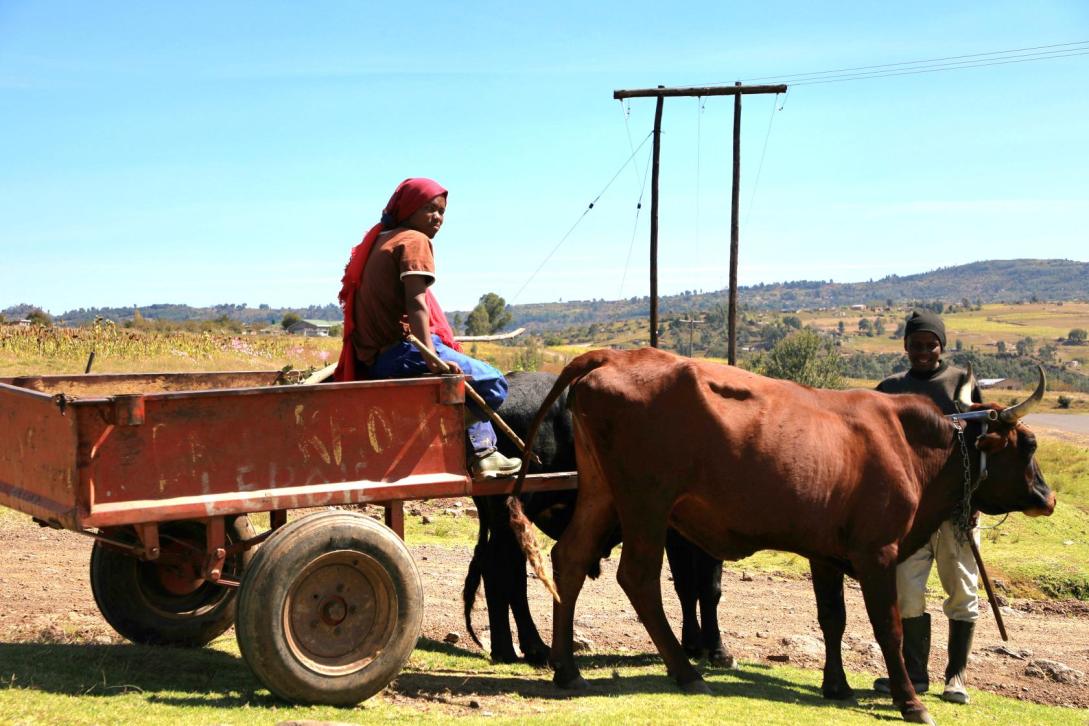Accelerating Action for Eliminating Child Labour & Forced Labour (AECFL) in Lesotho

The European Union in Lesotho (EU) is dedicated to creating a future free from child labour and forced labour by equipping Civil Society Organisations (CSOs), local leaders, communities, and youth to champion child protection. Through the Accelerating Action for Eliminating Child Labour & Forced Labour (AECFL) initiative, implemented by World Vision Austria and World Vision Lesotho in cooperation with various local partners, the EU emphasises capacity building, community engagement, and coordinated responses that empower children and communities to thrive safely. The AECFL initiative mobilises local resources, aligns with Lesotho’s legal frameworks, and strengthens reporting and support systems to protect against child exploitation and human trafficking, especially in vulnerable, rural communities.
Why?
Child and forced labour present serious and persistent challenges in Lesotho, where socioeconomic pressures, limited resources, and enforcement gaps contribute to exploitation risks for children. Key factors driving the need for AECFL include:
- Under-enforcement of legal protections: Despite the Children’s Protection and Welfare Act 2011 and Labour Act 2024 setting the minimum working age at 15, enforcement remains inconsistent, particularly in remote areas. AECFL targets these enforcement gaps, empowering local leaders to uphold child protection laws.
- Lack of community awareness: Many communities are unaware of the risks, signs, and indicators of child labour and forced labour, which hinders their ability to recognise or prevent exploitation. AECFL addresses this knowledge gap by launching awareness campaigns aimed at educating communities about their role in protecting children.
- Weak reporting and support mechanisms: Existing structures, such as Community Child Protection Teams (CCPTs), often lack the training and resources to respond effectively to child labour cases. AECFL strengthens these mechanisms, enhancing local capacity to identify, report, and support affected children.
- Empowerment of local stakeholders: By equipping CSOs, youth leaders, and traditional and faith-based leaders with the skills and knowledge to advocate against child labour, AECFL builds resilient communities that actively safeguard children’s rights.
How will this project address these issues?
- Capacity building for Community Child Protection Teams (CCCPTs): AECFL will train 140 CCCPT members (ensuring at least 50% female representation) across five high-risk districts. These members will be equipped to identify, report, and advocate against child labour within their communities, collaborating closely with district authorities to facilitate timely responses and referrals to support services.
- Youth leadership and community engagement: AECFL will foster youth leadership by engaging 100 youth leaders from active youth clubs and child parliaments. This engagement not only educates communities but also empowers young people to protect their peers and future generations from exploitation.
- Improved capacity for victim support and protection: AECFL will establish referral networks connecting victims with social protection services, helping to reduce their vulnerability and reintegrate them into safe, supportive environments.
- Legal and policy advocacy: AECFL strengthens the role of CSOs in monitoring and advocating for comprehensive child protection laws and policies. By holding stakeholders accountable and promoting the Lesotho Decent Work Agenda 2024 and National Action Plan against child labour, CSOs will drive policy improvements that benefit children across Lesotho.
- Community awareness campaigns: AECFL will implement awareness campaigns across Berea, Maseru, Mafeteng, Mohale’s Hoek, and Quthing with the estimated reach of 1 000 youth and 6 000 community members. These campaigns will educate community members on child labour risks, how to recognise exploitation indicators, and encourage preventive action, fostering a culture that proactively protects children.
- Media and public advocacy: By training 150 media professionals, AECFL will enhance the media’s role in documenting child labour issues, ensuring accurate and impactful reporting that reaches both the public and policymakers. Media engagement will help bring visibility to child labour cases and drive greater accountability from national stakeholders.
Background
The AECFL initiative aligns closely with the EU's broader goals of promoting child rights, social justice, and sustainable development. Child labour remains a pressing issue in Lesotho, particularly in rural districts where economic challenges put children at risk of exploitation. By focusing on high-risk districts, the AECFL initiative effectively targets areas with the greatest need, utilising local community structures such as Community Child Protection Teams (CCCPTs), faith and traditional leaders to safeguard vulnerable children.
The AECFL initiative represents a partnership between the EU, the Government of Lesotho, World Vision Austria and World Vision Lesotho, and local communities, and is more than just a regional intervention. It embodies the EU’s commitment to protecting children's rights globally, in line with the EU Strategy on the Rights of the Child and EU Action Plan on Human Rights and Democracy. These objectives emphasise protecting children from all forms of exploitation, enhancing local resilience, and supporting sustainable communities that prioritise child welfare.
Through this initiative, the EU reinforces its mission to build long-term peace, stability, and opportunity for all children. The EU’s financial contribution of EUR 400,000 (LSL 8 million) reflects its ongoing commitment to fostering community engagement and empowering local leaders, the initiative helps establish a foundation where children can grow in safety, ultimately contributing to a safer, more resilient Lesotho.





